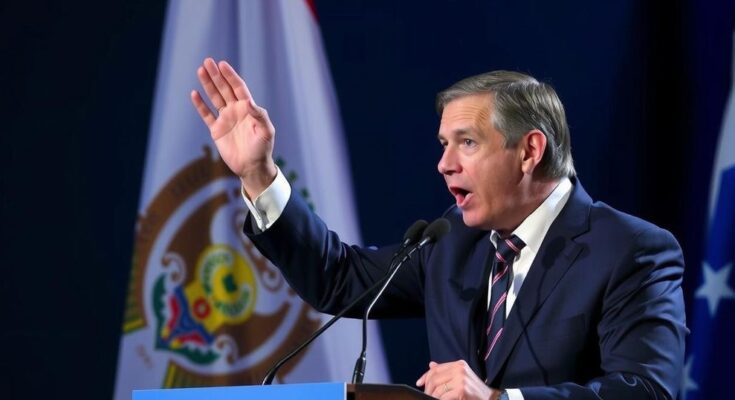In a hard-fought presidential runoff in Uruguay, left-wing candidate Yamandú Orsi emerged victorious over conservative Álvaro Delgado, who conceded defeat at a rally. Orsi received nearly 50% of the vote amidst an impressive voter turnout. Highlighting a global trend of anti-incumbent sentiment, this election signifies a shift in power after a brief conservative rule, with Orsi aspiring to unite the nation following a closely contested campaign.
On Sunday, Uruguay’s presidential runoff concluded with the conservative coalition’s candidate, Álvaro Delgado, conceding defeat after a closely contested election. His opponent, left-wing candidate Yamandú Orsi, successfully rallied support among voters and claimed victory at a celebration attended by jubilant crowds. Urging unity following the electoral results, Orsi emphasized the need for cooperation across political divides to build a stronger nation.
As of the tally, Orsi received approximately 49.56% of the votes compared to Delgado’s 46.17%, amidst a remarkable voter turnout nearing 90%. Despite a lack of dynamic campaigning compared to other countries, the election reflected a global trend of voters expressing dissatisfaction with incumbent governments. This shift also ended a brief tenure of center-right governance, following President Luis Lacalle Pou’s election in 2019.
In a message of goodwill, Lacalle Pou congratulated Orsi on social media and pledged support in the transition process. Orsi’s victory suggests a broader desire for change amid economic discontent stemming from the pandemic, although he presents himself as a moderate, opposing radical policy shifts. His platform focuses on pragmatic approaches to economic growth, social reforms, and enhancing investments without abandoning his predecessor’s fiscal policies.
Uruguay’s history includes significant social advancements under previous left-leaning leadership, including the legalization of same-sex marriage and abortion. Former President José Mujica, a mentor to Orsi, has voiced support for the incoming leader, acknowledging the respect for democratic institutions in Uruguay. In his acceptance speech, Orsi reiterated his commitment to dialogue and rebuilding national unity as he prepares to assume leadership.
The recent presidential runoff in Uruguay highlights significant electoral shifts within the country, as the conservative coalition faced a setback following a five-year tenure. The election results reflect a global pattern where incumbent parties are facing increased scrutiny and rejection amid persistent economic challenges and public discontent. As Uruguay has experienced a relatively stable political environment historically, Orsi’s moderate stance promises continuity within the framework of social welfare, prudent economic policies, and inclusivity in governance. The engagement of prominent political figures from the leftist legacy further connects the past achievements with the current political landscape.
In conclusion, the shift in Uruguay’s leadership from the conservative to the left-wing party underscores a growing desire for change amid economic and social challenges. Yamandú Orsi’s moderate approach may bridge divides and foster cooperation across the political spectrum, while his election reflects a broader trend of discontent with incumbents globally. As Uruguay embarks on this new chapter, Orsi’s leadership may very well balance progressive reforms with economic responsibility, thereby aligning with the nation’s historic patterns of governance.
Original Source: www.coastreporter.net




